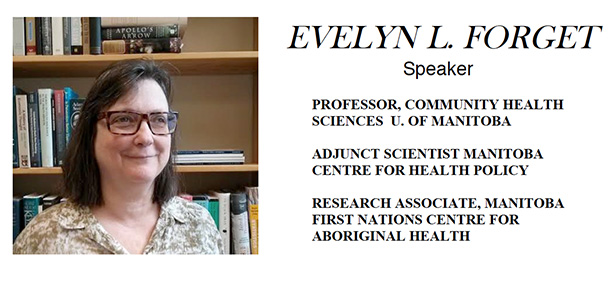“The Town with no Poverty: Would a guaranteed annual income be good for Canada?”
THUNDER BAY – The Lakehead Unitarian Fellowship presented the fourth lecture in the Ken Morrison (Big Ideas and Hard Questions for Our Time) Lecture Series.
It took take place on May 9, 2014, at 7PM EDT in the Galileo Room at the Italian Cultural Centre at 132 South Algoma Street, Thunder Bay.
The Lecture is available as a NetNewsLedger GO-LIVE Broadcast.
The guest lecturer was Dr. Evelyn Forget, an economist, professor in the Department of Community Health Sciences at the University of Manitoba.
Question and Answer Session
She is an adjunct scientist with the Manitoba Centre for Health Policy. Her current research focuses on the health and social consequences of anti-poverty interventions and the cost effectiveness of healthcare interventions.
Children living in poverty are less prepared for school when they enter kindergarten and do less well in math and reading in grade 3. They spend more time in hospital. The gaps widen as they age. They are less likely to graduate from high school, and more likely to be involved with Child and Family Services. Adults living in poverty spend more time in hospital and die many years earlier than others with higher incomes.
In the 1970’s, some people living in Winnipeg, and everyone in the town of Dauphin, Manitoba were chosen to participate in an ambitious project. They were guaranteed a minimum income based on their family size. If their income fell for any reason, they received payments designed to supplement their incomes. Did they all quit their jobs? How were their lives affected?
They didn’t quit their jobs. Adults with full-time jobs continued to work as before. Some women used the guaranteed income to “buy” themselves longer maternity leaves. Adolescents reduced the hours they worked significantly, mostly because they stayed in high school a little bit longer. This project used Manitoba Health data to find out what happened to participants in Dauphin. It found that hospitalizations fell by 8.5%. At a time when Canada spends more than $50 billion on hospitals, can we afford not to consider a guaranteed annual income?
For many reasons, the project ended and the idea of a Guaranteed Annual Income fell off the policy radar-until now. At a time when the economy is changing and many of us are beginning to wonder whether our children will live as well as we have, some people are again asking whether a Guaranteed Annual Income might be good, not only for the recipients, but for all Canadians? Can we afford to consider it and, more importantly, can we afford not to consider it?
Lakehead Unitarian Fellowship acknowledges the generous support of the Bay Credit Union.







